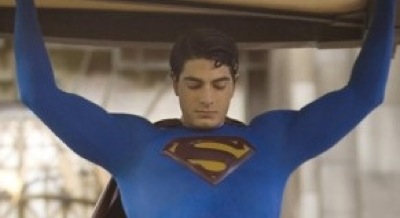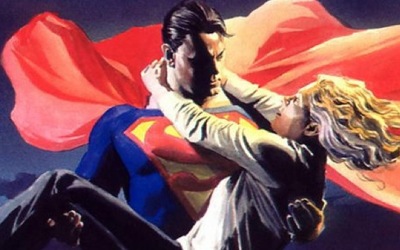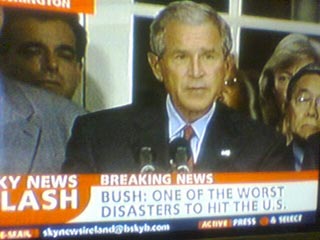There are few things in this life that make me feel like I’m seven years old again, but one of them is sitting in darkened movie theater in the seconds before the John Williams score introduces a new Superman movie. Of course, the last time I felt this way was just before The Phantom Menace started, so I was sort of ready to be bitterly disappointed again.
I wasn’t, although this movie is definitely a mixed bag for aficionados. As anyone who has read a review knows, Superman Returns was directed by Bryan Singer, who did a hell of a job of peppering the first two X-Men movies with winks at the comics-reading audience. Superman is a different story; the winks are at those of us who remember the first two Reeve films.
As for the comics continuity, forget it. Jonathan “Pa” Kent is dead; Lois is engaged to someone else (as opposed to being married to the Big Guy in the comics), and has a child old enough to make you wonder if she was knocked up in high school; and Superman himself has been away for the last five years or so on a homecoming jaunt to see the ruins of Krypton.
That’s the first thing that rings oddly about this flick—Superman is underpowered compared to the guy the comics readers are used to. In a breathtaking early scene, he saves both the space shuttle and a 747, but just barely; the print Kryptonian wouldn’t have strained nearly as hard. Likewise, it’s unclear why it would take five years to get to Krypton and back. In the movie he appears to have some sort of Kryptonian ship; in the comic, he gets around pretty well on his own with wormholes and the like, and can probably crack light speed on his own steam.
At the same time, he’s a bit too powerful to make for interesting movie villains. No human weapon can scratch him, as we’re shown during a great display of “faster than speeding bullet time”. Lex Luthor is dastardly as usual (and not the president, as he recently was in the comic), but all he’s got going for him is a few shards of kryptonite. Which, as per usual, is more darned easy to come by than fragments of a dead planet a galaxy away probably should be.
Kryptonite is another thing that gets the weird treatment. Canonical green-K kills Superman through radiation poisoning, but doesn’t take away his powers—although he might be too weak to use them. There was this scene recently where Superman and Batman got buried alive in a grave together after Superman got shot with a kryptonite bullet (bear with me, it made sense at the time); Batman frees them both by setting off a large explosive to blow them into the sewers, using Superman’s body as a blast shield. Naturally, both of them were in pretty bad shape by the time they made it back to the Batcave. Singer’s Superman, though, does seem to lose his powers when exposed to kryptonite; or at least, he loses them just enough for dramatic effect.
And that’s my biggest criticism of Superman Returns. This Superman just doesn’t seem all that heroic. DC has done a great job of coming up with storylines that challenge Superman’s powers, and he’s certainly gone through plenty of stretches without them—and he’s still the guy who the other heroes routinely refer to as “the best of us.” There are any number of characters flying around with Superman’s powers—off the top of my head I can think of two Supergirls, Superboy (a clone of Superman), Captain Marvel, Black Adam, Power Girl, and theoretically the entire population of Kandor if they could just get out of that bottle—but what made Superman a hero, to those who know him best, wasn’t being born on Krypton, it was being raised in Smallville.
Not so with the screen Supes. The married Lois in the comics didn’t marry Superman, she married Clark; it was only after they were engaged that he revealed his identity to her. Not so onscreen; this Lois has eyes only for Superman, and Clark Kent is as bumbling and annoying as ever. This follows in the footsteps of Christopher Reeve, but give me the comic Clark any day over this one.
Or the comic Superman. That one has too much sense of responsibility to Earth to fly away for five years. That one wouldn’t get the crap beaten out of him by three punks who wouldn’t make Batman break a sweat, kryptonite or no kryptonite. That one wouldn’t use X-ray vision and super-hearing to spy on an ex-girfriend in one particularly creepy scene.
So, you might think by now that I don’t like this movie. And you’d be wrong. I thought it was great, had a blast, looking forward to the next one. It’s just that this isn’t really the same guy I read about in the comic books, and I had a few things to get off my chest. You could say the same about Batman Begins, a great movie in which the hero clearly isn’t the Caped Crusader I know, because he wouldn’t reveal his secret identity to some floozy he used to date.
But, hey, Singer? Next time? Give the guy a proper S. This one is a little scrawny. (Illustration by Alex Ross, from JLA: Liberty and Justice.)


